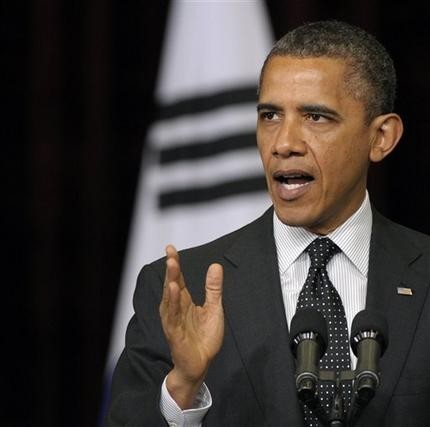CARTAGENA, Colombia - President Barack Obama is touting the growing economies of Latin America, saying the region has moved well beyond an era of cold war tensions and now presents a tremendous trade opportunity for the United States.
He says "clean transparent government" is essential to create opportunity for the region's people. He complimented the governments of Colombia and Brazil for creating effective government that have sustained economic growth.
Obama was speaking Saturday at a CEO summit during the Summit of the Americas in Colombia. The president was aiming to convince U.S. business leaders that he's serious about expanding trade in Latin America.
Obama says 40 percent of U.S. exports go to this region, supporting nearly 4 million U.S. jobs. China, however, has become a bigger trading partner with some South American countries.
THIS IS A BREAKING NEWS UPDATE. Check back soon for further information. AP's earlier story is below.
President Barack Obama's challenge during a weekend summit in Colombia with business executives and political leaders from the Americas is convincing U.S. business that he's serious about expanding trade in Latin America and persuading the region to look northward once again.
"Put simply, we have one of the world's most dynamic trade relationships," he planned to tell CEOs on Saturday during the sixth Summit of the Americas.
But playing the persuader is not an easy task. The U.S. faces trade competition from China, resistance from labor at home, a set of difficult regional issues that could dilute any focus on trade, and now the distraction of Secret Service agents in Cartagena relieved of duty on allegations of misconduct.
The business session was expected to include executives from Wal-Mart Stores Inc., PepsiCo, Yahoo and Caterpillar.
"Here in Latin America, the U.S. is the largest foreign investor, and we're the largest customer of manufactured goods from countries across the hemisphere," according to Obama's remarks released in advance by released by the White House.
While U.S. exports in dollar amounts have increased in the Americas, its share of the market has declined over the past decade. China, in particular, is surpassing the U.S as a trading partner with Brazil, Chile, and Peru.
In the United States, labor is restive over a trade deal with Colombia that is awaiting final certification. The Colombian government has worked to meet the requirements of a labor rights agreement that was a condition of passage in Congress last year. The question in Cartagena was whether Obama, over the objections of U.S. union leaders, would certify that Colombia successfully has met the terms.
U.S. Chamber of Commerce President Tom Donohue said in an interview Saturday that even if Obama did not take that step while in Cartagena, a final certification probably would come soon. He said Obama may not make a major announcement so as not to irritate allies who oppose the deal.
Trade could be eclipsed by other issues: the discussion over Cuba's exclusion from the summit; a call from Latin American countries to consider legalizing drugs to ease the violence associated with narcotrafficking; even Argentina's claims to the British-controlled Falkland Islands.
Adding an embarrassing wrinkle to the visit was Friday's acknowledgement by the Secret Service that agents facing allegations of misconduct for deeds before the president's arrival had been sent home.
What's more, U.S. influence in Latin America has waned as countries such as Brazil and Chile gain economic stature. The U.S. no longer can buy its standing in the Americas through development assistance.
Obama was appealing to the business leaders to work with governments to expand commerce and help improve the lives of people mired in poverty despite the region's improving economic stance.
"Governments can't do it alone," he said. "We need you - the private sector - to work with us. We need your ideas. We need you to join with us. Working together, I'm confident that we can advance the jobs, prosperity and opportunity that our people seek."
Among those pushing Obama to engage further in trade with Latin America is the U.S. Chamber of Commerce. Donohue told business leaders in Colombia that the U.S. is focusing too much on the Asia-Pacific region at the expense of Latin America. He called for more countries from the Americas to join the Trans-Pacific Partnership, which includes Chile and Peru.
"When people think about trans-Pacific they're all thinking about Asia," Donohue said in the interview. "The reason I raised that is to put focus on the bigger question: `Where are we going to put our assets? Where are we going to put our energy?'"
Donohue is pressing for a trade deal with Brazil, South America's largest economy and one with growing global influence. But he acknowledged that there is no appetite in the United States to initiate such a step before the November elections.
Obama, in answers to questions submitted by Latin American journalists before leaving for Cartagena, said the U.S. exports three times more to Latin America than to China. He said 60 percent of Latin America's exports to the United States are manufactured goods, whereas 87 percent of Latin America's exports to China were commodities.
"We believe that economic partnerships can't just be about nations extracting another's resources," he said.
The U.S. relationship with Argentina is increasingly contentious. U.S. companies complain that Argentina is erecting sizable barriers to U.S. exports. The Obama administration has bristled at the behavior and some in Washington wonder whether Argentina will retain in the Group of 20 large and emerging world economies.
Those issues could likely come up when Obama meets with Argentina's president, Cristina Fernandez, on Sunday.
Saturday
July 12th, 2025
8:19PM









